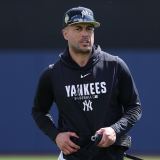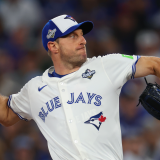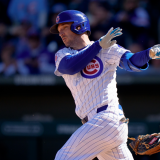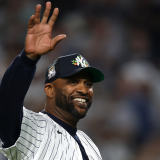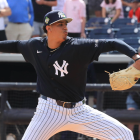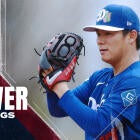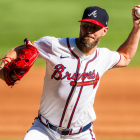Core Values: New York Mets
Our 'Core Values' preseason series continues, and today we're breaking what lies at the heart of the Mets at this moment in time -- and with an eye toward future seasons.
 |
| David Wright is very much the present in Queens, but what about the future? (Getty Images) |
In order to prime you for the 2013 season, we here at Eye on Baseball are in the early midst of examining each team's "core." The march toward all 30 clubs continues again today with the New York Mets.
RELATED -- Core Values: Tampa Bay Rays
First things first: What's a core? For our purposes, a team's core comprises a "cornerstone player," a "face of the franchise" and then the "future face of the franchise."
So what's a "cornerstone player"? For starters, it's one of the best players on the roster and perhaps the very best player on the roster. Beyond that, though, it's the player whom the organization has identified as the talent around which to build by signing him to a long-term deal. In other words, they've backed their faith in the player's abilities with the most powerful statement of all: lots of redeemable U.S. currency. Not only do they see this player as central to their current aims but also to their designs on future contention.
What's a "face of the franchise"? He -- and we're getting subjective here -- is the player who most prominently embodies the franchise in question. He's that player you think about when you think about this team. Is he the same guy as the "cornerstone"? Sometimes. But the cornerstone is primarily a financial designation. The "face" is, for lack of a better term, a cultural identifier. They're not mutually exclusive, but they're not not mutually exclusive, either.
What about the word "values" you see in the headline above? After we identify and evaluate the three elements of the the core, we're going to slap a letter grade on the whole thing.
And now let's crack open the core of the Mets ...
Cornerstone player(s): David Wright
Were there ever any doubts about whom the Mets viewed as their franchise player, they ended on Dec. 12 of last year, when they announced an eight-year, $138 million extension with Wright. The deal -- narrowly the largest in franchise history -- means that Wright will remain a Metropolitan at least through the 2020 season, at which point Wright will be 38 years old. This massive pact follows up the six-year, $55 million deal Wright signed in 2007, so there's no doubting the mutual commitment on each side.
None of this would have been possible without Wright's resurgence in 2012. In 2011, Wright's production cratered (well, "cratered" according to his high standards -- he was still a useful player) in part because of an early-season stress fracture in his back. Last season, though, Wright rebounded to hit .306/.391/.492 with 21 homers and 41 doubles. Also encouraging is that, according to both advanced metrics and the eyeball test, Wright improved in the field. All of that bodes well moving forward.
Of course, Wright's new contract, as mentioned, will carry him deep into his 30s, and at some point his decline phase will set in. Wright almost certainly won't be worth the money on the back end, but that's the price teams must pay to lock up superstars and near-superstars. Wright will still be a productive player by the time the Mets are ready to contend again, and his re-signing sends of a message of self-investment to a fan base that's been given so many reasons for cynicism.
Face(s) of the franchise: David Wright
Yes, in this instance the cornerstone and face are one in the same. Wright was probably already the face of the Mets even when R.A. Dickey was still a teammates. Sure, Dickey melded excellence and personal narrative like few others, but he was a journeyman. Wright, in contrast, is a Mets lifer (the Mets made him the 38th overall pick of the 2001 draft)
Will Wright end his career as the greatest Met of all-time? He'll very soon be the greatest Met position player in franchise history, and the life of his new contract will provide him ample opportunity to overtake Tom Seaver (in terms of one particular thumbnail measure, Wright checks in with a 39.1 bWAR, while Seaver racked up a bWAR of 72.9 during his seasons in Queens) as the greatest Met in the annals of all who have called themselves Mets.
Throw in the distinct possibility that Wright will be a "cradle to grave" Met, and his legacy figures to become even stronger.
Face(s) of the future: The young rotation
While Mets rooters can find much to bemoan these days, they've rather quietly cobbled together the makings of a stunning young rotation. Matt Harvey? The 23-year-old right-hander posted a 2.73 ERA, 70 strikeouts and a 1.146 WHIP across 10 starts in his rookie season. With his plus fastball and plus breaking ball, he profiles as a frontline starter in the majors. Happily enough for the Mets, 22-year-old righty Zack Wheeler also profiles as a frontline starter. Wheeler has command of four major-league pitches, and his curve projects as a true out pitch. He should hit Queens for good at some point in 2013.
That's not all. Righty Noah Syndergaard (acquired from the Blue Jays in the Dickey trade) will slot in nicely behind Harvey and Wheeler and, thanks in part to a top-of-the-line fastball, forecasts as a potential number-two starter in the majors. Young Michael Fulmer, age 19, already flashes an impressive fastball-slider power combo, and if his off-speed stuff develops as anticipated, then he'll turn into another No. 2 starter type. And all of this is to say nothing of Jon Niese, who is still just 26 years of age. In want of depth? Jeurys Familia and Jenrry Mejia are here to help. All of that, suffice it to say, is an envious load of young starting pitching.
Remember "Generation K," the young pitching trio of Paul Wilson, Jason Isringhausen and Bill Pulsipher that was supposed to anchor the Mets' hopes for years to come? They did not, to say the least. This group, however, very much has the upside to be what Generation K was supposed to be. That's why the Mets' future begins and ends with their young rotation.
Casting ahead, the Mets will be in tough spot, what with the Braves and Nationals being poised to contend for years to come. But if the Mets' rotation develops as hoped and expected, then better days will be ahead.
Mets' Core Value: B+. Please note that we're not saying the Mets are a B+ team right now. Rather, the core merits a B+. The talent surrounding that core is not similarly impressive.
On Tuesday, we'll break down the Core Values of the Chicago Cubs.
For more baseball news, rumors and analysis, follow @EyeOnBaseball on Twitter, subscribe to the RSS feed and "like" us on Facebook.



